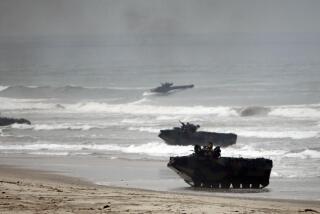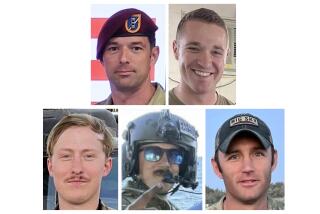2,000 Marines Receive Warm Welcome Home
CAMP PENDLETON — CAMP PENDLETON -- With tearful and flag-waving family members waiting to embrace them, Marines from the 15th Marine Expeditionary Unit returned home Sunday after a seven-month overseas deployment that included service in Afghanistan.
“God has answered my prayers and brought my boy home safe,” said Linda Green of Muncie, Ind., sobbing as she hugged her son, Cpl. Charles Green Jr., who was still toting an M-16 rifle.
Even as he kissed his mother and shook hands with his father, Green received a cellular telephone call from his fiance in Los Angeles.
Green was among 2,000 Marines returning aboard three ships of the Peleliu Amphibious Ready Group. The vessels, the assault ship Peleliu and its smaller companion ships, Comstock and Dubuque, will dock today in San Diego.
“Daddy!” yelled Jeffrey Matthews Jr., 7, as he raced toward his father, Chief Warrant Officer Jeffrey Matthews.
As Marines climbed out of helicopters, family members strained to see if their loved one was among the green uniforms. When the answer was yes, the response was instantaneous.
“I’m just so happy,” said Brittany Williams, 15, niece of Master Gunnery Sgt. Scott Miller. “Now our lives can be full again, our family is more complete.”
Anticipation of home had increased as the ships neared the end of the long return journey.
“It’s like Dorothy and Toto: There’s no place like home,” said Navy Capt. William Jezierski, commodore of the Peleliu group. “And there’s no place like the U.S.A.”
After leaving Aug. 13 for a routine deployment in the Arabian Sea and Western Pacific, the 4,000 Marines and sailors of the Peleliu group found themselves on the front lines of the war on terrorism after the Sept. 11 attacks.
On Nov. 25, more than 1,500 of the Marines established a base at Camp Rhino, an abandoned Taliban facility in the trackless desert of southern Afghanistan, 400 miles from the Arabian Sea. After Navy Seabees forged an airstrip, planes and helicopters brought troops and supplies in a nightly airlift, turning Rhino into a hub for U.S. military action in the region.
Marine “hunter-killer” teams disrupted and intimidated Taliban and Al Qaeda forces attempting to flee the battle for the Taliban stronghold of Kandahar and possibly regroup for a counterattack. The Marines later took control of the war-ravaged Kandahar airport, 90 miles farther inland, solidifying the hold of anti-Taliban forces.
By pushing so fast and so far inland, the Marines defied conventional warfare doctrine that, as an amphibious force, the Marines’ effectiveness is largely limited to within 200 miles of the ocean.
“You have set the standard by which [other Marine units] will be judged,” Lt. Gen. Michael Hagee, commanding officer of the 1st Marine Expeditionary Force, told the Marines aboard the Peleliu as they neared Camp Pendleton.
If the Marines in Afghanistan set a record, so did the sailors. The three ships went 139 days in the Arabian Sea without a port call, weeks longer than usual. The 15th Marine Expeditionary Unit--one of seven such units in the Marines--is set for another six-month deployment next year.
“We’re happy to be home, but we can’t just drop our pack and say, ‘That’s gone forever,’” said Maj. Beau Higgins, an intelligence officer, who was greeted by his wife and children.
“Next year we’ll be out again--it could be the Philippines, Afghanistan, Somalia, Yemen, lots of places,” he said. “It’s a strange world out there.”
More to Read
Sign up for Essential California
The most important California stories and recommendations in your inbox every morning.
You may occasionally receive promotional content from the Los Angeles Times.










